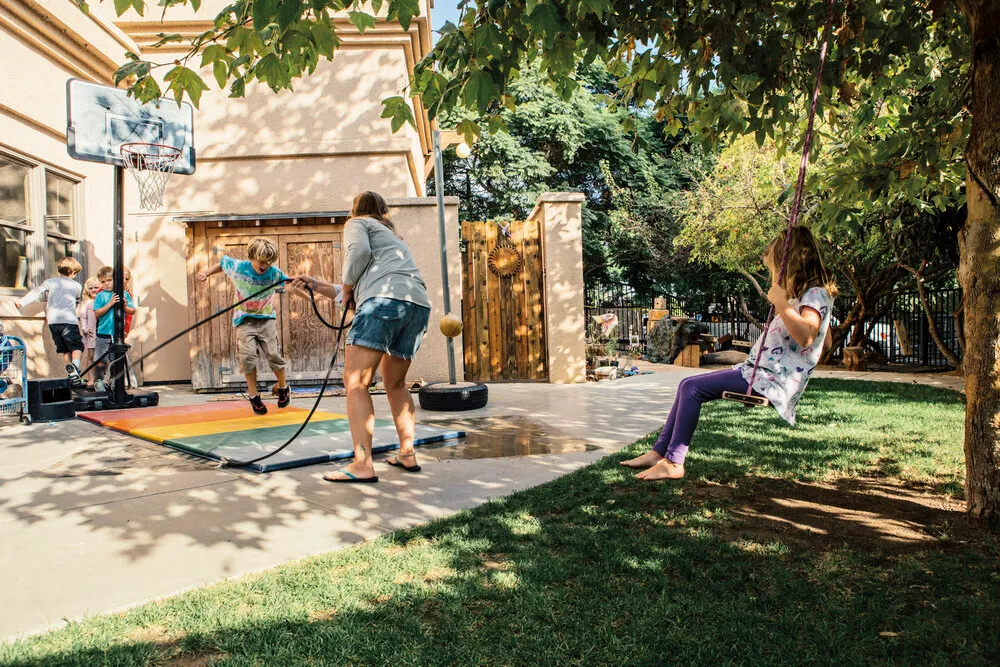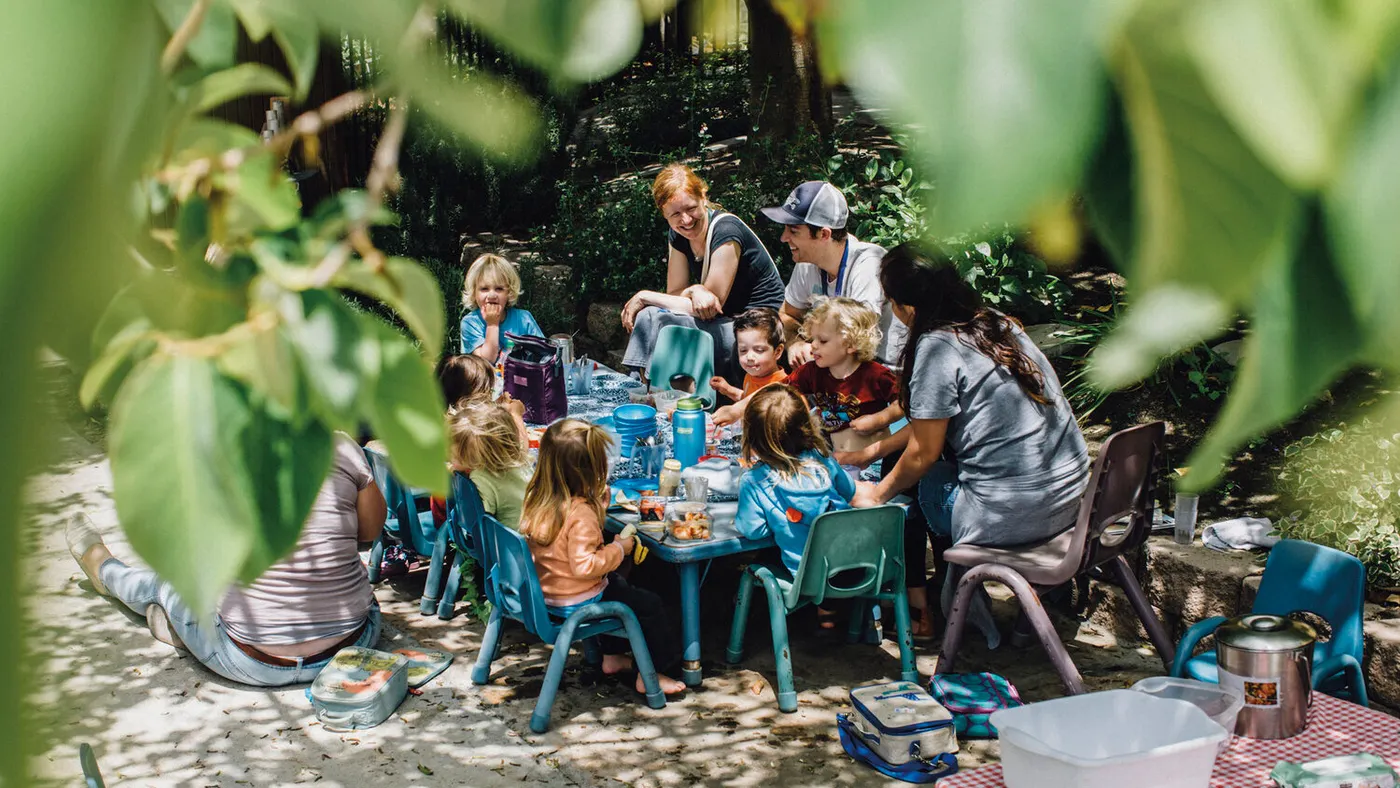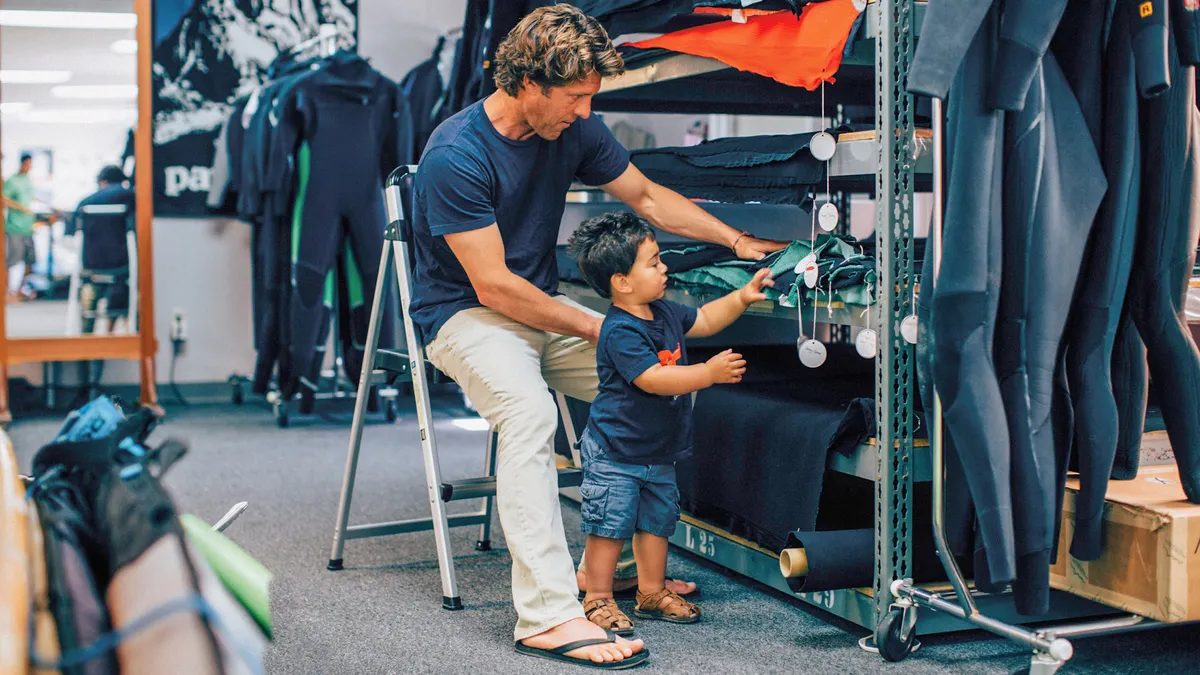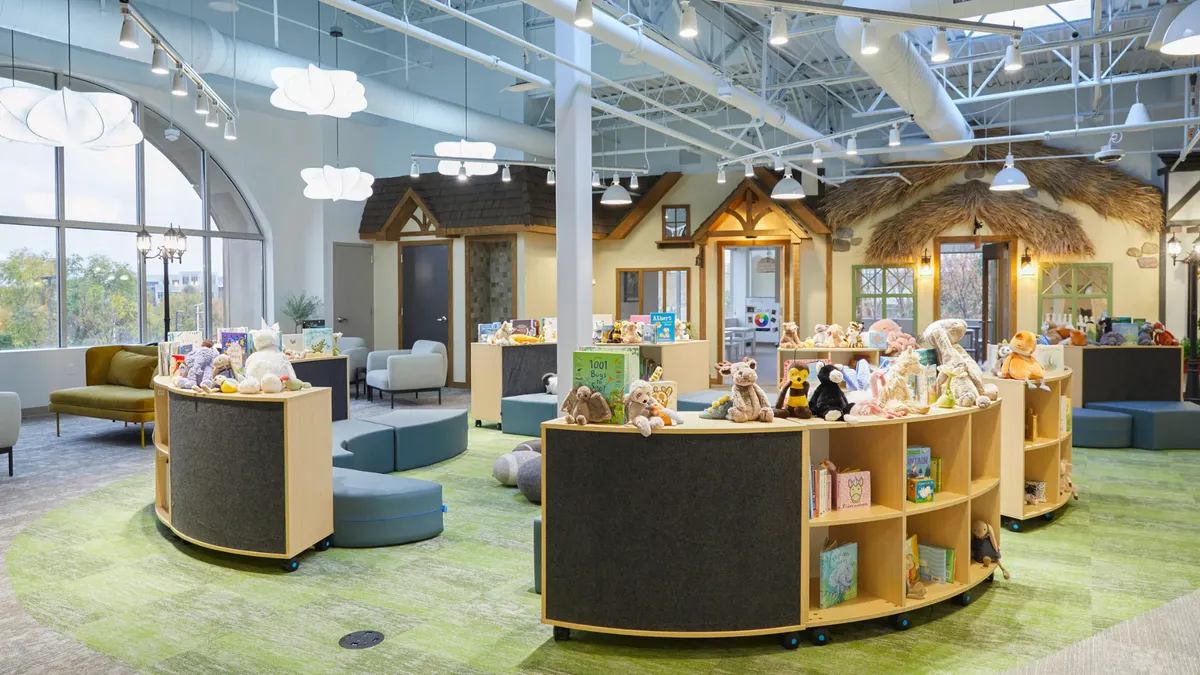This is the fifth installment of a five-part series on employers offering on-site day care.
Chris Lopez wakes at 6:15 a.m. on work mornings. He and his wife have a routine that will sound familiar to many parents: take a shower, get the kids — a 5-year-old daughter and 1-year-old son — dressed for the day, feed them some oatmeal and blueberries. Then, feed the dog and make sure his son doesn’t help himself to the kibble while his wife makes the kids’ lunches.
Around 7:40, he and his family all pile into the car for the 25-minute drive into Ventura, California, from their Ojai abode, typically to the soundtrack of Lilo and Stitch. When they arrive at Patagonia’s headquarters, all four pile out, ready to start their days.
Lopez and his wife both work at Patagonia and they alternate who drops off which child depending on their schedules. When Lopez drops off his daughter, they perform another routine: “She’ll push me out the door, then want a kiss and hug, and then want to do high-fives through the glass door,” he said.
Finally, Lopez walks across campus, grabbing a bite from the company cafe on his way, and settles down at his desk by 8:30.
Transitioning to care
Lopez started applying for positions at Patagonia in early 2019, shortly after finding out his wife, who began working for the company more than a decade before, was pregnant. He was working in sales at the time for another Ventura-based company, and was tired of leaving early, working late and facing the never-ending onslaught of sales questions: “Are you going to hit goal? Did you sign the deal? What will it take to get them to sign today? Have you tried calling them again?”
“I wanted to be with my family,” he said. “I knew that in order to do that, I had to find a company that cared about family as well.”
Their daughter arrived that November, and Lopez landed a role at Patagonia the following January — accepting a 45% pay cut for the opportunity to see his wife and daughter during the day. When the pandemic hit two months later, he was furloughed. Working in the facilities department at the time, he was one of the first back at the office when it began to open up again, replacing faucets with hand-motion models and readying the building for occupancy. Lopez’ daughter started in Patagonia’s child care center in January 2021, at around 14 months old.
Three years later, in January 2024, the couple added a son to their family; he joined his sister at the center in June.
Alison Huyett, senior strategist for brand and impact at Patagonia, was already working at the company when her son Finn was born in 2022. She took 16 weeks of maternity leave — nearly 100% of moms at the company return from maternity leave, according to Sheryl Shushan, director of global family services — and Finn began infant care at Patagonia’s center when her leave ended.
While it was a hard transition, Huyett said she was eager to get back to work and be around adults again. She packed up Finn in an infant seat and e-biked the mile and a half to campus.
Knowing the way Patagonia runs the child care center and the center’s values helped ease the transition, Huyett said. The company provides a kind of onboarding for new parents, helping them build trust in the care providers.

A different kind of work-life balance
After dropoff, it isn’t unusual for Huyett and Lopez to hear from care staff during the day. While every parent with a kid in day care knows the sinking feeling of seeing the center’s phone number pop up — usually a call about an injury or illness with a request for pickup — it can reach out with smaller updates and questions, leaning into the flexibility of having a parent nearby.
Lopez’ wife often dropped by to nurse her kids in a private room at a text message’s prompting, for example, while Huyett usually opted to pump throughout the day and provide bottles. But Huyett appreciated that she could walk downstairs for a few minutes if she needed a snuggle or if Finn was having a hard day.
Similarly, instead of worrying all day after hearing his son had bumped his head and scuffed his nose while playing on a chair, Lopez was able to drop by and see him in minutes.
“There he was, you know, a little scuffed-up bloody nose, but he was smiling and ... just happy to see me,” he said. “You still get to be there through the bumps and the scratches and the pains, but also the fun parts, too.”
Indeed, Lopez noted, it's common for parents to visit their kids throughout the day for lunch or other activities.
Fostering workplace connections
One potential benefit of on-site care that’s harder to quantify is how having family members on site deepens connections among colleagues who also have children in the center.
For Huyett, it was important that Finn grow up around other children, and being able to connect with other parents who are also colleagues “has created a really fun community,” she said.
Finn has been in the same class with another boy since both were four months old, making them “like brothers,” Huyett said. In turn, she and her husband have become close with the boy’s parents. “We all hang out ... And seeing them grow up together has been really unique and cool.”
Similarly, children from Lopez’s daughter’s Patagonia classroom attended her horseback riding birthday party last year — bringing youngsters and colleagues together as friends outside of work. As workplace experience and support manager, Lopez’ role at the company is now focused on fostering these connections. In addition to other events, Patagonia hosts a companywide, family-friendly event annually at Mammoth Mountain for its Ventura staff.
Nicole Riehl, president and CEO of Executives Partnering to Invest in Children, has observed this phenomenon at other workplaces, too.
EPIC worked with Guild, an employee upskilling and learning vendor, in downtown Denver to create the Beehive Early Childhood Center for employees. Workers can see their children playing on the playground and participate in holiday parades.
“There’s definitely a very different level of connection that happens, even amongst employees working in different divisions or different teams,” Riehl said. “C-suite level leaders who might have kids in that on-site child care [are] having direct conversations with people who may be individual contributors in that organization.”
Overall, it’s this deeper feeling of support and connection — both with family and work colleagues — that makes on-site day care a different kind of benefit. “I can’t explain the feeling,” Lopez said. “You feel home. You feel comfortable.”
Visuals Editor Shaun Lucas contributed to this story.













